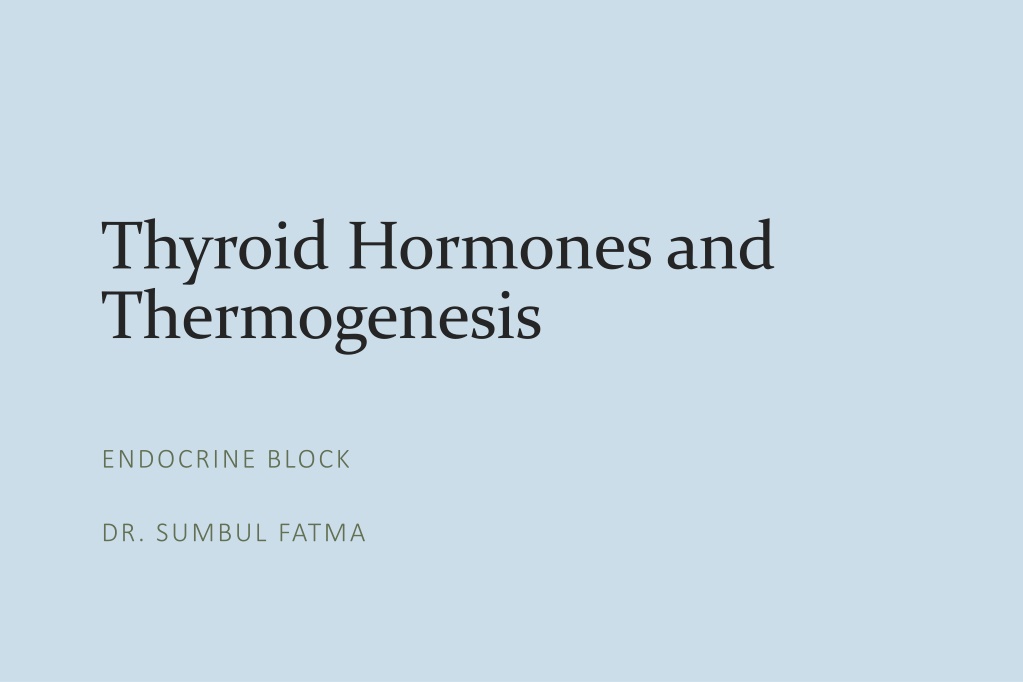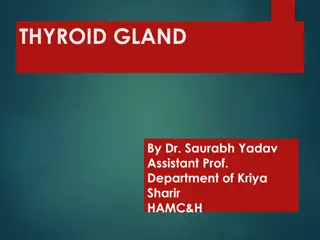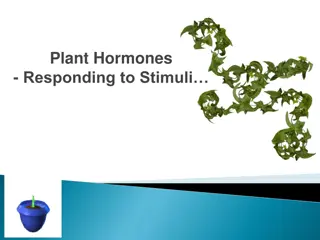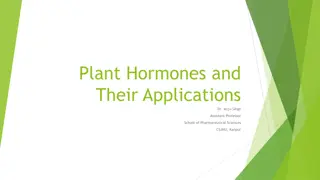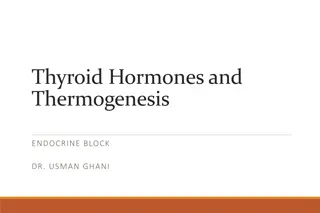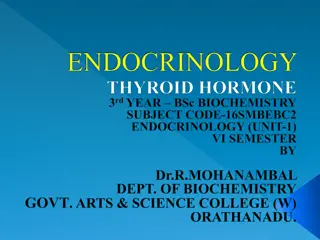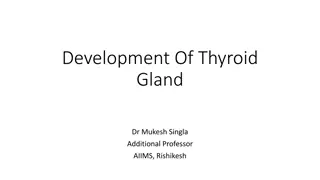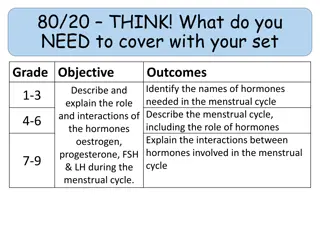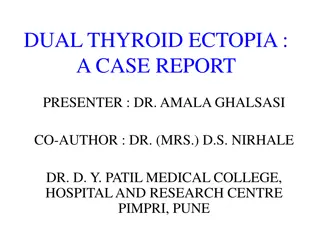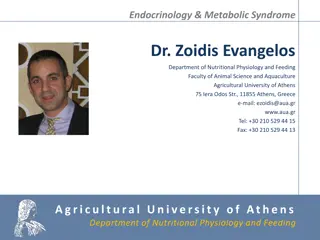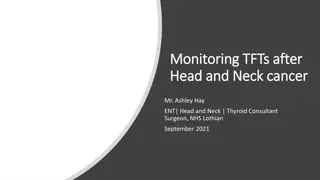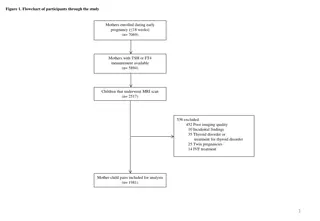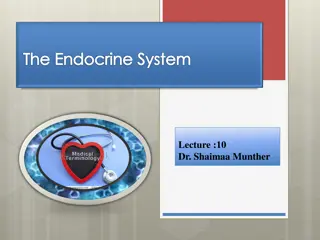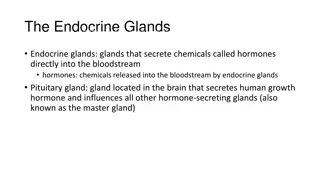Understanding Thyroid Hormones and Thermogenesis in Endocrinology
This lecture covers the types, biosynthesis, actions, regulation, and clinical implications of thyroid hormones. It explains the functions of thyroxine (T4) and tri-iodothyronine (T3), their synthesis in the thyroid gland, and their transport in the body. The role of thyroid hormones in thermogenesis, metabolic regulation, and maturation of body tissues is discussed, along with clinical manifestations of hormonal imbalances. The lecture also touches upon the regulation of thyroid hormone secretion via the hypothalamic-pituitary-thyroid axis.
Download Presentation

Please find below an Image/Link to download the presentation.
The content on the website is provided AS IS for your information and personal use only. It may not be sold, licensed, or shared on other websites without obtaining consent from the author. Download presentation by click this link. If you encounter any issues during the download, it is possible that the publisher has removed the file from their server.
E N D
Presentation Transcript
Thyroid Hormones and Thermogenesis ENDOCRINE BLOCK DR. SUMBUL FATMA
Objectives: By the end of this lecture, the Second Year students will be able to: Describe the types and biosynthesis, actions and the regulation of thyroid hormones List and interpret the thyroid function tests Define goiter and differentiate between hypo- and hyperthyroidism Discuss the role of thyroid hormone in thermogenesis
Types and Biosynthesis of Thyroid Hormones Thyroxine (T4) and tri-iodothyronine (T3) Synthesized in the thyroid gland by: Iodination and coupling of two tyrosine molecules Binding to thyroglobulin protein Thyroid gland mostly secretes T4 Peripheral tissues (liver, kidney, etc.) de-iodinate T4 to T3 Deiodination is catalyzed by deiodinase enzymes T4can be metabolized to rT3(inactive form)
Types and Biosynthesis of Thyroid Hormones T3is more biologically active form Most of T4is transported in plasma as protein- bound Thyroxin Binding globulin (TBG)-bound (70%) Albumin-bound (25%) Transthyretin (pre-albumin)-bound (5%) The unbound (free) form of T4and T3are biologically active
Thyroid hormone action Plays an essential role in maturation of all body tissues Involved in thermogenesis and metabolic regulation Increases cellular oxygen consumption and stimulates the metabolic rate Affects the rate of protein, carbohydrate and lipid metabolism
Thyroid Hormone Action Clinical evidence of the wide spectrum of thyroid hormone action: Untreated congenital hypothyroidism permanent brain damage Hypothyroid children have: Delayed skeletal maturation short stature Delayed puberty Hypothyroid patients have high serum cholesterol due to: Down regulation of LDL receptors on liver cells Failure of sterol excretion via the gut
Regulation of Thyroid Hormone Secretion The hypothalamic-pituitary-thyroid axis regulates thyroid secretion The hypothalamus senses low levels of T3/T4and releases thyrotropin releasing hormone (TRH) TRH stimulates the pituitary to produce thyroid stimulating hormone (TSH)
Regulation of Thyroid Hormone Secretion TSH stimulates the thyroid to produce T3/T4until levels return to normal T3/T4exert negative feed back control on the hypothalamus and pituitary Controlling the release of both TRH and TSH
Regulation of Thyroid Hormone Secretion High thyroid hormone levels suppress TRH, TSH Low thyroid hormone levels stimulate TRH, TSH to produce more hormone Clinical Chemistry, Bishop, 7th Edition, pp. 492.
Thyroid Function Tests I. TSH measurement: Assessment of thyroid function Highly sensitive test (detects very low conc.) II. Total T4 or free T4: Assessment of thyroid function Monitors thyroid treatment (both anti-thyroid and thyroid replacement treatment) TSH may take up to 8 weeks to adjust to new level during treatment
Thyroid Function Tests III. Total T3 or free T3: Useful for assessing hyperthyroidism in which rise in T3 is independent of T4 In some patients only T3 rises (T4 is normal): T3 toxicosis For earlier identification of thyrotoxicosis IV. Antibodies: Diagnosis and monitoring of autoimmune thyroid disease: Hashimoto s thyroiditis (antibodies against TSH receptors that suppress thyroid secretion Graves disease (antibodies against TSH receptors that stimulate thyroid secretion)
Goitre, Hypo and Hyperthyroidism Enlarged thyroid gland Goitre may be associated with: Hypofunction Hyperfunction Normal thyroid hormone conc. (euthyroid) Causes: Iodine, selenium deficiency Hashimoto s thyroiditis Graves disease (hyperthyroidism) Congenital hypothyroidism / thyroid cancer
Hypothyroidism Deficiency of thyroid hormones Primary hypothyroidism: Failure of thyroid gland (Elevated TSH, deficiency of thyroid hormones) Secondary hypothyroidism: Failure of the pituitary gland to secrete TSH (rare) Failure of the hypothalamic-pituitary-thyroid axis
Hypothyroidism Causes: Hashimoto s thyroiditis Radioiodine or surgical treatment of hyperthyroidism Drug effects TSH deficiency Congenital defects in thyroid synthesis / thyroid resistance Severe iodine deficiency Clinical features Tiredness / cold intolerance / weight gain / dry skin Treatment Replacement therapy with levothyroxine (T4)
Hypothyroidism Non-thyroidal illness In some diseases, the normal regulation of TSH, T3 and T4 secretion and metabolism is disturbed Most of T4 is converted to rT3 (inactive) Causing thyroid hormone deficiency Secretion of T4 and T3 is decreased
Hyperthyroidism Hyperstimulation of thyroid gland by pituitary gland Hypersecretion of thyroid hormones Tissues are exposed to high levels of thyroid hormones (thyrotoxicosis) Causes: Graves disease Toxic multinodular goitre Thyroid adenoma Thyroiditis Excessive intake of iodine / iodine drugs Excessive intake of T4 and T3
Hyperthyroidism Clinical features: Weight loss with normal appetite Sweating / heat intolerance Fatigue Palpitation / agitation, tremor Angina, heart failure Diarrhea Eyelid retraction and lid lag
Graves disease Most common cause of hyperthyroidism An autoimmune disease Due to antibodies against TSH receptors on thyroid gland The antibodies mimic the action of pituitary hormone Causing hypersecretion of thyroid hormone
Hyperthyroidism Diagnosis Suppressed / undetectable TSH level Raised thyroid hormones levels Confirms primary hyperthyroidism Problems in diagnosis Total serum T4 varies due to changes in binding protein levels High estrogens in pregnancy increase TBG synthesis Total T4 will be high, free T4 will be normal
Hyperthyroidism Congenital TBG deficiency can also influence results Free T4 and TSH are first-line tests for diagnosis of thyroid dysfunction Treatment Antithyroid drugs: carbimazole, propylthiouracil Radioiodine: sodium 131I inhibits T4/T3 synthesis Surgery: thyroidectomy
Thermogenesis (Heat production) Thermogenesis (Heat production) Humans are homeothermic (keep constant body temp.) Tightly controlled temperature homeostasis Thermogenesis is of two types: Obligatory: Heat production due to basal metabolic rate Facultative: On-demand extra heat production from metabolic activity in brown adipose tissue, skeletal muscle, etc. Facultative thermogenesis in brown adipose tissue is stimulated by sympathetic nervous system
Thyroid Hormone and Thermogenesis Thyroid hormone plays essential roles in thermogenesis It upregulates body temperature set by the brain It acts centrally on the hypothalamus that controls brown adipose tissue for thermogenesis
Two concepts of thyroid thermogenesis Thyroid hormone (T3) 2. New: Central brown fat Body tissue cells (muscle, liver) Hypothalamus Activates brown adipose tissue Activates certain enzymes by an unknown mechanism Increased body energy expenditure THERMOGENESIS
Two concepts of thyroid thermogenesis
In respiratory chain, some protons reenter the mitochondrial matrix thru uncoupling proteins (UCPs) without ATP synthesis These protons are released as heat Thyroid hormone regulates mitochondrial UCPs Examples: UCP1 in brown adipose tissue UCP3 in muscle, other tissues
Take home message Thyroid hormones are synthesized in the thyroid gland by iodination, coupling and binding to thyroglobulin protein Thyroid hormones regulate metabolism and thermogenesis in the body It is regulated by hypothalamic-pituitary-thyroid axis Thyroid function tests such as TSH, total and free T4 and T3, and antibodies help diagnose and follow up thyroid disorders Goiter, hypo- and hyperthyroidism are due to abnormalities in thyroid functions
References Clinical Biochemistry: An Illustrated Colour Text, 5th Edition 2013, Allan Gaw, pp. 88-93, Churchill Livingstone, UK. Nedergaard, J and Cannon, B. Thyroid hormones: igniting brown fat via the brain. Nature Medicine, Volume 16, Number 9, pp. 965-967, 2010.
